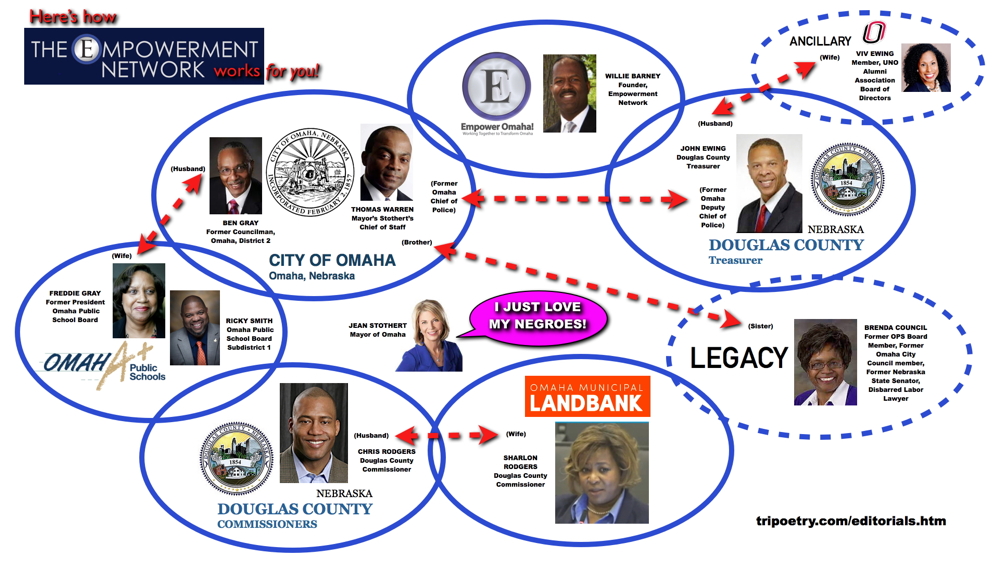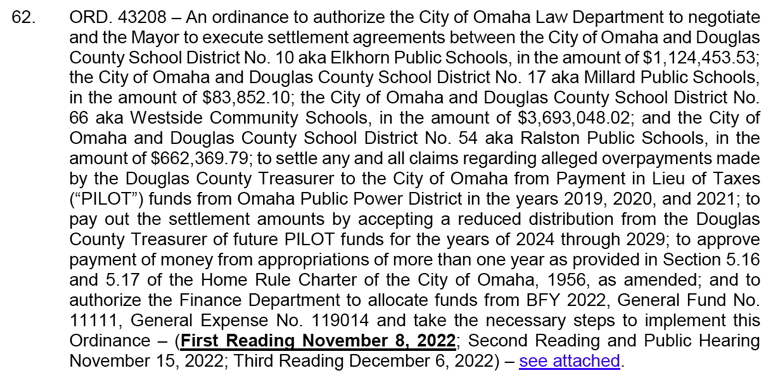
Hello, Mr. Ewing:As a former police officer surely you've issued several speeding tickets to drivers who say, "I didn't know I was speeding," and you'd promptly respond with that well-known phrase enthusiasticly used by police officers everywhere, "Ignorance is no excuse."
So, you've been using a well-worn 61-year-old formula to calculate the distribution of annual payments OPPD makes in liew of paying property taxes. Well, golly gee-whiz, John, that wasn't very smart was it?
The following is a true story.
It was 1998, and I had just been hired by Denver Public Schools (DPS) and placed on a Pay-for-Performance (PFP) Committee composed of six-(6) members from the Dallas Classroom Teachers Association (DCTA) bargaining unit (union) and six-(6) members from DPS administration, which included me as the compensation expert. For the first week I listened and watched as the union and administration talked and talked but never actually achieved anything. Frankly, despite all of the "required formal education" and advance degrees, I've never been around more incompetence, buffoonery, and overt stupidity than my encounters with "academicians" and senior leadership in K-12 public education (including Chicago, Dallas, Omaha, etc). As a point of reference, I've been immediately responsible for managing human resources in public/private sector, profit/non-profit, union/non-union, multi-site/multi-state, and international environments, which includes aerospace, public education, financial services, health care (acute, long-term care, medical research), gaming, IT, retail, manufacturing, municipal government, property/casualty insurance, broadcasting, and HR Consulting. So, my assessment of "academicians" and senior leadership in K-12 public education is not without robust, hands-on, on-site knowledge of how truly successful organizations perform.
Given the absence of any actual progress to create a PFP, and at my own initiative, I conducted an independent analysis to specificially define the structure, protocol, and most importantly, how to establish compensation practices for a PFP. Now pay attention, John, one of the first things I do, everywhere I've worked, is to review and analyze pay structures and salary schedules. Why? If you truly want to find how things "actually work," it's best to begin with discovering how employees are paid, where are the inequities, what are the HRIS, ERP, and related data system calculations and links between automated, legacy, and/or manual systems that potentially could be problematic. Keep in mind, the employer is not necessarily required to correct any inequities or anomalies, but generally "senior leadership" perfer not to be blindsided by the stupidity of lower management that might result in government imposed fines, penalties, and civil and/or criminal litigation. Yes, John, I've saved employers millions via my due diligence. Back to DPS . . .
So, after doing the research, I built a new salary schedule for teachers that:
1. Eliminated the salary cap for 48% of employees who had reached their salary grade ceilings;
2. Improved market competitiveness;
3. Saved DPS nearly $7 million in salary expenditures over a period of five-(5) years; and most importantly,
4. Had $0 cost of implementation.I showed my PFP model to "senior HR leadership" and was told, "Don't show this to anyone." Of course, as directed, I did not show my work product to anyone, so it sat on my computer for over a year. Then, one day, "senior HR leadership" came to my office:
Senior HR Leadership
"Trip, do you still have that plan, your idea for saving all that money?"
Trip Reynolds
Yes
Senior HR Leadership
Get it, and let's go see Irv.
[Irv Moskowitz, Superintendent, Denver Public Schools]
Trip collected the "plan" and accompanied
senior HR leadership to the Office of the Superintendent
Superintendent
Is this true? Can we save all this money,
raise teacher pay, and it doesn't cost us anything?
How? Has Velma seen this?
Superintendent picked-up his phone and called
Velma, the Chief Financial Officer (CFO)
to come to his office.
Superintendent
Velma, have you seen this?
What Trip has done here, is this for real?
Can we actually do this?
Chief Financial Officer (Velma)
Yes, Trip's analysis is correct.
Superintendent
Trip, I don't get it.
How did you come up with this?
Trip Reynolds
One of the first things I do, everywhere I've worked,
is to review and analyze pay structures and salary schedules.
In my review of the teacher's salary schedule I found an error
in the design of the structure, and that mathematical error
cascaded throughout the rest of the structure. Second, I
needed to determine when the error occurred in order
to determine the total scope and cost of the impact, both
short-term and long-term (year-over-year). Eventually,
I discovered the error in the structure occurred in 1947.
So, I fixed the error in the teacher's salary schedule, then
extrapolated the corrected structure to 1998, then moved
all teachers to the closest step and grade in the
new structure, which was typically a lower step but
established a much higher salary and much more
room for salary growth. Since 48% of teachers
are maxed out, and have absolutely no room for salary
growth, this structure gives maxed-out teachers at least
two to nine additional years of salary growth,
plus along with my PFP plan would
be a win-win for everyone.
Superintendent
Trip, you actually went back 51 years
to look at our teacher salary schedule in 1947?
Trip Reynolds
Yes, that's what I do. Beside, they
didn't have Excel in 1947. Of course,
I can't explain why no one else ever
looked or decided to check the math.
Unfortunately, instead of adopting my PFP as I proposed, and expanding the analysis to the eight additional bargaining units, DPS elected to use the "savings" as a bonus plan for teachers, and without PFP. Then, six-(6) years later DPS had a $30 million budget shortfall, and my position was eliminated via a RIF (reduction-in-force). Ironically, if my PFP had been implemented as I proposed DPS would not have experienced a budget shortfall. John, you do realize, don't you, the loss of tax revenue literally cost some employees their jobs, or prevented the hiring of new employees? Well, John? Clearly, there are consequences to negligence.
John, you were and remain blatantly negligent for not reviewing the accuracy of EVERY calculation used to tax citizens in Douglas County - period. No excuses are acceptable. As reported in the Nebraska Examiner, "Ewing has called the mixup an honest mistake and a continuation of a practice that had been used for 61 years." Oh no, John, you don't get off that easy, because the "mistake" should have been identified after forty-six-(46) years, concurrent with you becoming Douglas County Treasurer since 2007. For the past fifteen-(15) years the "mistake" is solely on YOU!
As VP or Director or Manger of Human Resources it's been my role to terminate employees of such negligence. You do realize, don't you, John, that a cashier or bank teller can be terminated "for cause" for being out-of-balance for just a few hundred dollars or more, which is considerably less than the millions and millions and millions of dollars your negligence has caused. You should be ashamed.
Some people say I'm too hard on "you people" at the Empowerment Network. Well, John, you tell me. Again, as a former police officer surely you've issued several speeding tickets to drivers who say, "I didn't know I was speeding," and you'd promptly respond with that well-known phrase enthusiasticly used by police officers everywhere, "Ignorance is no excuse."
And this is leadership?
P.S. (smile) As expected, John, the White folks have to clean-up your mess. Bummer.
The Big Payback! Omaha City Council Agenda 11.08.22
Click the image
above to listen to
"The Big Payback"
To read all about
"The Big Payback,"
click here.
I welcome your feedback.
Trip Reynolds
trip.reynolds@yahoo.com
![]()
 |
Reynolds' Rap First Amendment to the United States Constitution - Congress shall make no law respecting an establishment of religion, or prohibiting the free exercise thereof; or abridging the freedom of speech, or of the press; or the right of the people peaceably to assemble, and to petition the Government for a redress of grievances. |


